Can Dogs Eat Pumpkin Seeds? Is It Beneficial For Them?
28.04.2022.
There are numerous tasty and nutritious foods that can be safely included in your dog's diet. Pumpkin seeds, for example, are a popular pet-owner snack that can also be appreciated by your four-legged companion. Here's everything you need to know about pumpkin seeds, including their health benefits and how to feed them to your dog safely.
So, what exactly are pumpkin seeds?
The edible seeds of pumpkins and other squash veggies are known as pumpkin seeds. They are flat, dark-green seeds with a whitish husk surrounding them. They are commonly referred to as "pepitas" in North America.
They're soft and chewy, and they're best served roasted when their texture becomes crisper. They have a nutty, sweet flavor.
Pumpkin seeds are a part of the Cucurbitaceae (gourd) family, which includes cucumber and watermelon, as well as the Cucurbita genus, which includes all pumpkins.
Cucurbita pepo, Cucurbita maxima, Cucurbita mixta, and Cucurbita moschata are the most frequent pumpkin species utilized for pumpkin seeds.
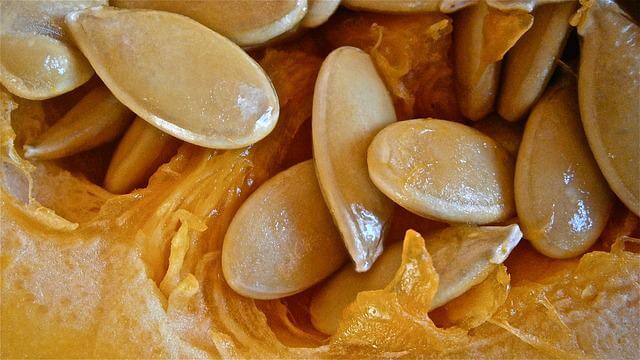
They are a nutrient-dense food that is sometimes referred to as "superfood" due to their abundance of essential nutrients. The most common ways to eat pumpkin seeds are dried and roasted.
Is it okay for dogs to eat pumpkin seeds?
Pumpkin seeds aren't harmful, but they aren't the most gut-friendly meal when consumed in large quantities. They're safe for dogs to eat, according to veterinarians, but moderation is crucial.
Because they don't break down quickly in the digestive system and can create irritation or pain, they should be consumed in moderation. If your dog ingests a large quantity of them, a veterinarian may advise inducing vomiting to avoid potential issues.
Pumpkin seed benefits for dogs
Because of the curiosity about how pumpkin seeds benefit humans, they have been widely investigated in human clinical studies, and their numerous health advantages are explained.
Many human advantages may also apply to our canine friends, although it's best to check with your dog's veterinarian before you decide to include anything new in your dog's diet. Veterinarians are now recommending them as an occasional snack or a ground-up addition to your dog's food.
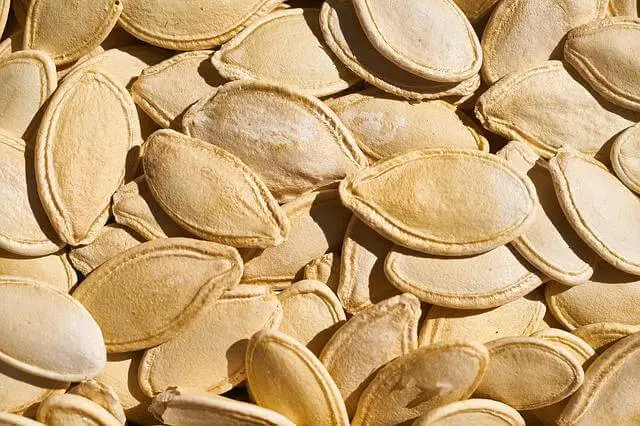
Dogs may eat both the pumpkin meat and the seeds, and there are numerous health benefits from doing so. The best things pumpkin seeds have to offer to our dogs are;
Urinary health promotion
Pumpkin seeds contain loads of antioxidants and healthy fatty acids, which help maintain urinary tract health and prevent infections. They are also beneficial for preventing kidney stones from forming or helping dislodge existing kidney stones.
Anti-inflammatory activity
Pumpkin seeds are abundant in omega fatty acids. These acids act as inflammation reduction. This is beneficial for common dog ailments like osteoarthritis and canine hip dysplasia.
Helps with prostate gland enlargement
Pumpkin seeds showed excellent results in reducing the discomfort of male dogs with an enlarged prostate or benign prostatic hyperplasia.
Healthy fats
These delicious seeds contain loads of lipids, vital nutrients for survival. They are high in polyunsaturated and monounsaturated fats, which can help lower bad cholesterol while raising good cholesterol levels.
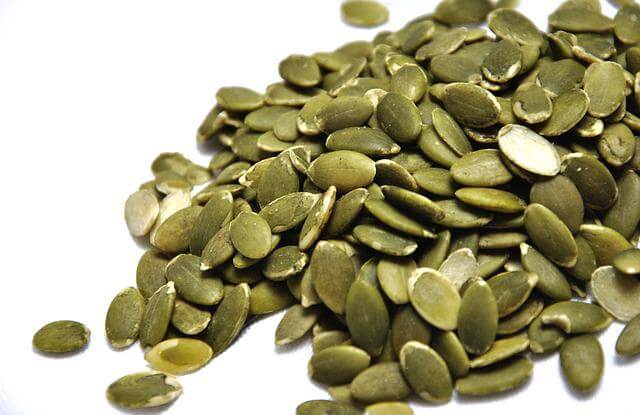
Cardiovascular health boost
Vitamin E and K, found in pumpkin seeds, offer benefits and a health boost to the dog's cardiovascular health. The essential vitamin E decreases blood pressure and helps protect body cells from the damage free radicals can cause. In contrast, Vitamin K is essential for blood clotting after tissue damage.
Potential issues
The majority of research has concentrated on the benefits pumpkin seeds have to offer, which are numerous. Still, there are potential issues dog owners should know about.
These all have to do with the processing and storing of pumpkin seeds, so it's crucial to be aware of them and avoid any undesirable consequences.
Salt
Salt is commonly used in the commercial preparation of pumpkin seeds. Adding salt to your dog's diet can be harmful to their health and cause sodium imbalances in the body. Always make sure there is no extra salt when sharing some pumpkin seeds with your dog.
Bacteria
Fresh seeds can decay quickly, posing a hazard to your pet. It is preferable to roast them because they can survive much longer and are more palatable.
Storage issues
Seeds that aren't kept in airtight containers can rot and become harmful. Pumpkin seeds that were adequately preserved and roasted can survive for months.
Is it possible to kill intestinal worms with these seeds?
Pumpkin seeds, according to some herbalists, are an all-natural home treatment for intestinal worms. Veterinarians, on the other hand, argue that this is incorrect.
It's critical to speak with your veterinarian if your dog has an intestinal parasite, such as tapeworms or roundworms, which are common pests that can be easily picked up from other animals and the environment. They'll be able to provide the appropriate medication to safely and successfully treat your dog. It's critical to maintain your dog on a prophylactic medication to help ward off these troublesome parasites. Your veterinarian can advise you on which one is best for your dog individually.
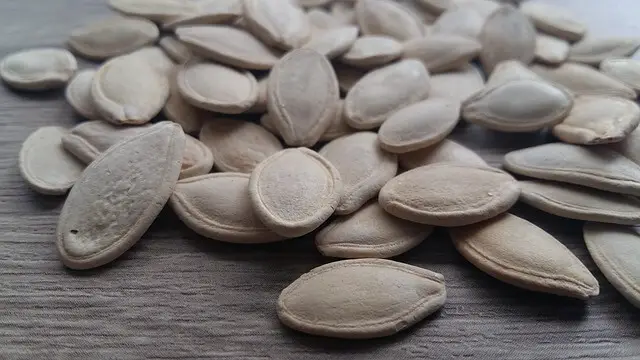
How to safely include pumpkin seeds in your dog's diet?
If you avoid recipes that include many additional ingredients, such as sugar and salt, and the seeds are peeled and cooked, you can definitely give your dog some in small amounts.
You have complete control over how you feed them. It would be easier for dogs to digest and pass them if they were ground. Some people grind pumpkin seeds to make them into a protein supplement.
While people consume pumpkin seeds for their nutritional value, dogs have different dietary requirements. An excellent dog food, according to our nutritional experts, is your best bet for a healthy, happy dog. There's no need to supplement with pumpkin seeds if the dog is eating high-quality, well-balanced dog food. If you want to give them a nutritious boost, stick to half a tablespoon for every ten pounds of your dog's body weight.
World Dog Finder team

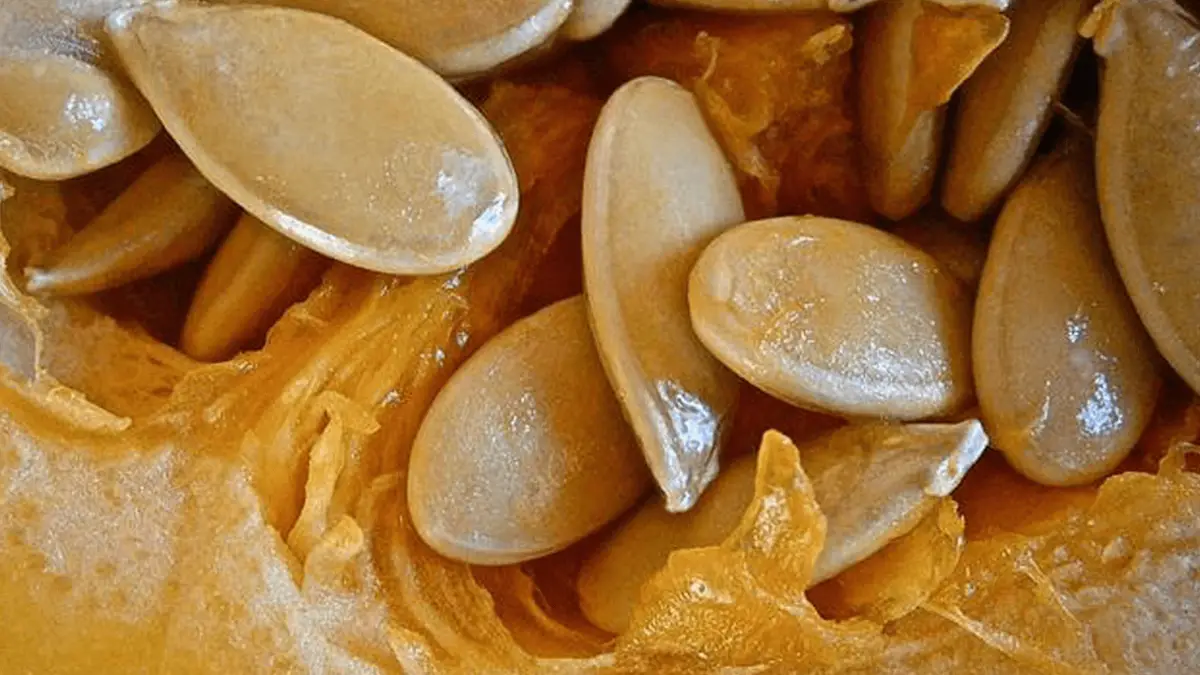
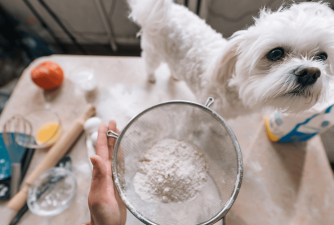
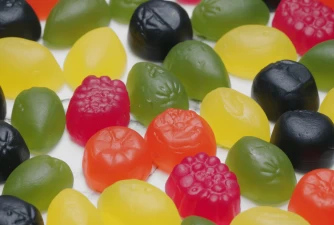
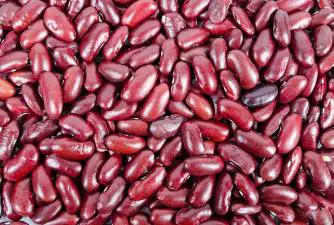
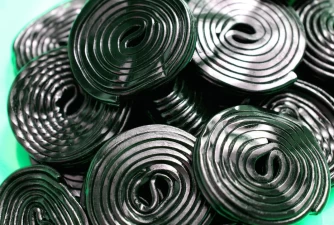

Share